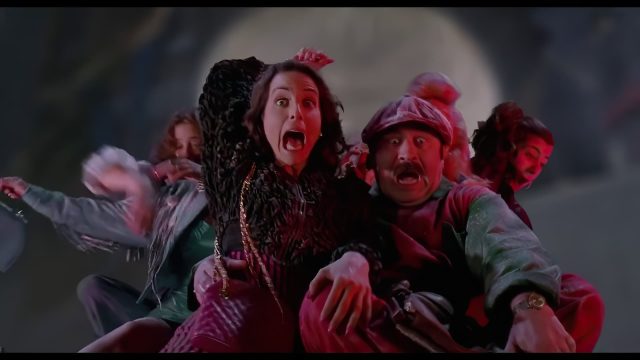This Week You Will Experience Wonders and Controversies In:
- film!
- music!
- biographies!
- video games!
- short stories!
Thanks to scb0212 and Miller for contributing this week. Send articles throughout the next week to ploughmanplods [at] gmail, post articles from the past week below for discussion, and Have a Happy Friday!
ReverseShot‘s Ricky D’Ambrose talks to Kelly Reichardt as her new film Showing Up debuts:
When I go to see art, I find myself often looking at how the people are looking at art, and that’s what I end up taking so many pictures of in galleries. The one thing you realize by spending time with people in their studios is that a lot of artmaking is standing back and looking at what you did. Which is the same as with editing: you’re constantly rolling away from the table and looking at what you did. Standing back and checking out the progress. So that is always somewhat in the mix of what dictates how things are going to be shot, apart from thinking of how I want to shoot something when I’m working on the script. And how I want to shoot something comes down to something like, “Michelle, you will have to do this in a single take, because there’s one figurine to work with. Good luck, ok go.”
At Pitchfork, Andy Cush looks back at Warren Zevon’s self-titled album:
“Don’t the sun look angry through the trees?” Zevon asks … in “Desperados Under the Eaves,” a final flash of daylight on an otherwise nocturnal album, the warm rays conveying retribution rather than relief. “Don’t the trees look like crucified thieves?” he continues. “Don’t you feel like desperados under the eaves?” Maybe “Frank and Jesse James” is a dream of the sort of noble, swashbuckling existence the album’s wayward men convince themselves they are leading. In a moment of astonishing audacity, “Desperados” closes with Zevon mimicking the hum of an air conditioner. Its gentle drone, massaging the raw edges of a hangover, becomes a triumphant melodic theme, with piano and strings soon arriving to accompany the humming, like the music that might play at the end of a cowboy movie as the heroes ride off across the plain.
For Texas Monthly, Michael Hall investigates a would-be biographer of Robert Johnson and how he wound up sabotaging his own in-depth research:
It was clear that Book Two was as full of invented dialogue and scenes as any of Mack’s plays. I was shocked at my gullibility, embarrassed at my willingness to believe every tale this storyteller had told. Could it really be that Mack—angry and bitter at a world that had lionized Robert Johnson and never given his most enterprising biographer his proper due—had spent his final twenty years trying to destroy the Robert Johnson he had helped discover, telling anyone who would listen—Gioia, Sullivan, Susannah, Wood—that we had the wrong guy?
At Kotaku, Kenneth Shepard asks – among so many other questions in the universe – whether Hogwarts Legacy could have been the time for the wizarding world to dump Slytherin:
If there were ever a time to remove the Slytherin name from Hogwarts, it was when he was spouting prejudiced nonsense, but the next best time would be when it was clear he was involved in the death of students like Myrtle Warren, who died when Voldemort let the Basilisk loose on the school’s muggle-born population. The next, next best time would be when Voldemort was defeated, and his rise to power was easily traced back to Slytherin’s own views—after all, Voldemort is literally called the “Heir of Slytherin.” And yet, Albus Potter is told by his own father to believe that the Slytherin name is a badge of honor, even if it doesn’t align with what the rest of his family got when they were declared brave and sorted into Gryffindor. But this is the frustrating part of the Harry Potter ethos. It’s intrinsic to the series to believe that the systems in place are not the problem, it’s bad actors within those systems. For this universe, the status quo is the goal. The bar is never raised beyond how the wizarding world was when Harry arrived in it, just set back in place by protagonists after evil-doers temporarily dislodge it.
Megan Milks provides crucial information about Kelly Link’s new story collection “White Cat, Black Dog” at 4Columns:
I want to say more about all of these, but abundant twists make them difficult to describe without spoilers. My favorites swing into clarity at the end, like a puzzle that’s fuzzy until the last piece is placed. …What I can tell you is that they reward multiple readings. Also, there is a cat (or cat joke) in most. And they are unstinting evidence (if we needed more) that the fairy-tale resurgence Link has helped to shepherd remains robust, tenacious, here.
Finally, Variety‘s Ethan Shanfeld looks back on the extreme negative reaction to 1993’s Super Mario Bros, the deathblow to its directors’ careers, and its reconsideration thanks to… Quentin Tarantino?!
The director believes the film got swept up in negative cultural attitudes toward video games in the 1990s. “There was a huge outcry in America about how video games were being forced down the throats of our children and polluting our youth,” Morton says. “That they’re not doing their homework and video games are affecting their brains and their diets. These games were viewed as this kind of evil monster.” He continues, “For Hollywood to say, ‘Now we’re going to turn these video games into movies,’ that was the straw that broke the camel’s back. It opened the floodgates of people’s vitriol against video games. The ‘Super Mario Bros.’ movie was in the front line and took all the flak.”

